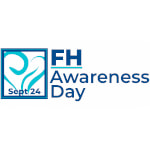FH Awareness Day Date in the current year: September 24, 2026
 FH Awareness Day is observed annually on September 24. It was created to raise awareness of familial hypercholesterolemia (FH), a genetic disorder characterized by high cholesterol levels from birth and an increased risk of early cardiovascular disease.
FH Awareness Day is observed annually on September 24. It was created to raise awareness of familial hypercholesterolemia (FH), a genetic disorder characterized by high cholesterol levels from birth and an increased risk of early cardiovascular disease.Lipids and lipoproteins play an important role in ensuring that cells receive enough energy. However, abnormally high or low levels of these substances can have adverse health consequences. Metabolic disorders characterized by abnormal amounts of lipids or lipoproteins in the blood are collectively known as dyslipidemia.
Hypercholesterolemia is a type of dyslipidemia characterized by abnormally high cholesterol levels. It can be caused by an imbalanced diet high in sugar and saturated fats, certain medical conditions or medications, obesity, physical inactivity, smoking, and excessive alcohol consumption. Genetic factors can also cause high cholesterol levels; this subtype of hypercholesterolemia is called familial hypercholesterolemia (FH).
FH is usually caused by a mutation on chromosome 19 that affects the production or function of the low-density lipoprotein receptor (LDLR), which is responsible for bringing cholesterol-rich low-density lipoprotein (LDL) from the bloodstream into cells. Consequently, cholesterol builds up in the bloodstream and artery walls, which can lead to early cardiovascular disease.
There are two types of FH: heterozygous and homozygous. Those with heterozygous FH have one abnormal copy of the LDLR gene and may develop cardiovascular disease in their 30s or 40s. Those with homozygous FH have two abnormal copies of the gene and may develop severe cardiovascular disease in childhood. Homozygous FH is extremely rare, while heterozygous FH is a common disorder, affecting about 1 in 250 people.
FH usually does not cause symptoms until cardiovascular complications arise, though some patients develop yellow, cholesterol-rich deposits in various places on their bodies. It is estimated that 70-85% of people with FH remain undiagnosed and untreated. The disease is actually easy to diagnose with a simple blood test and can be confirmed with genetic testing if necessary. However, many people with FH do not seek diagnosis and treatment because they are asymptomatic.
Heterozygous FH is treated with lipid-lowering agents, such as statins and bile acid sequestrants. Controlling other risk factors for cardiovascular disease, such as a poor diet, physical inactivity, excessive alcohol consumption, and smoking, is also important. Homozygous FH is much harder to treat due to its severity. It often does not respond well to medications, even in high doses, and may require LDL removal from the blood via a procedure called LDL apheresis or a liver transplant.
FH Awareness Day was established in 2012 by the US-based Family Heart Foundation. The day aims to raise global awareness of familial hypercholesterolemia, educate the public about the difference between high cholesterol and genetically caused high cholesterol, and encourage individuals with a family history of high cholesterol or cardiovascular disease to get tested for FH.
- Category
- International Observances
- Tags
- FH Awareness Day, familial hypercholesterolemia, international observances, awareness days, dyslipidemia